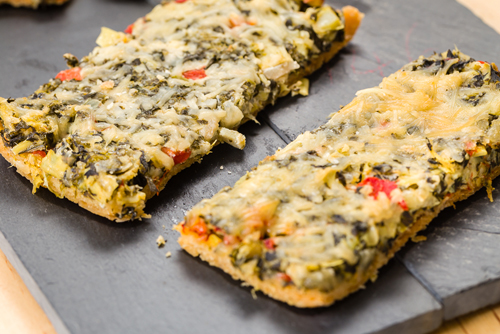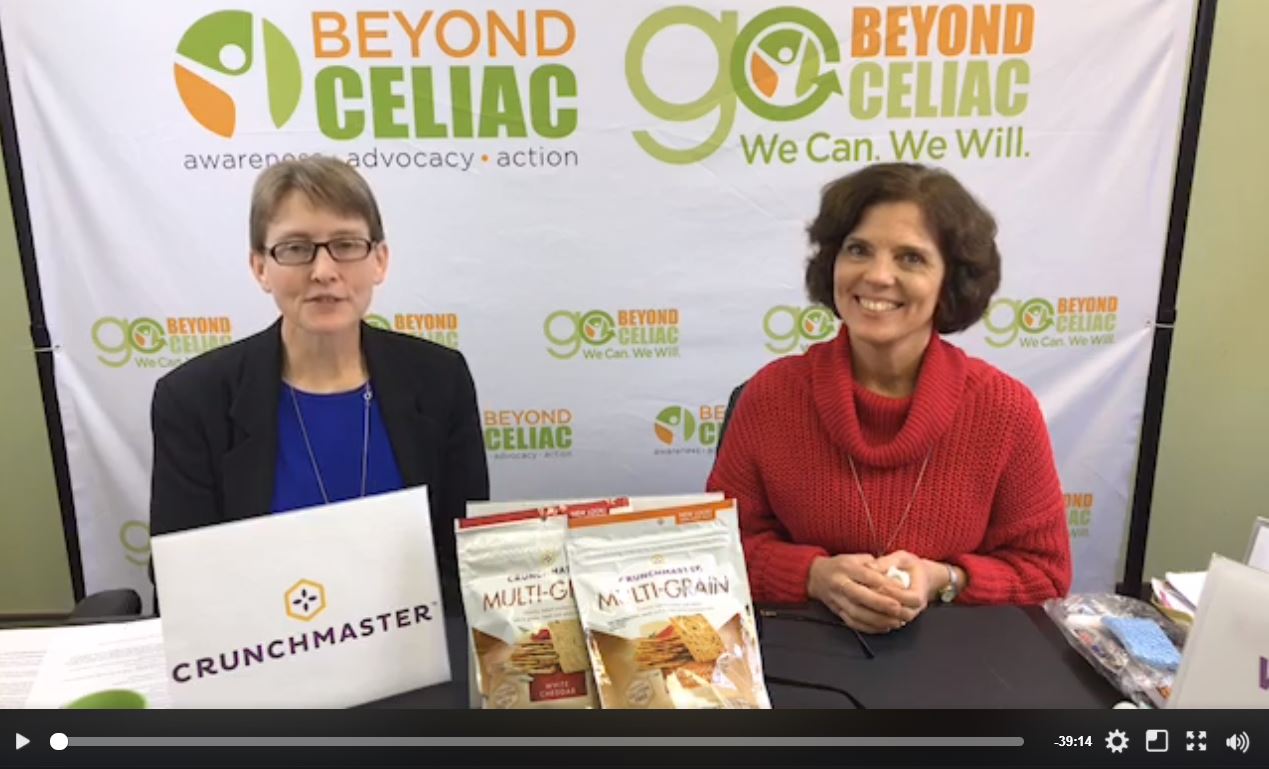01/01/2018
COLUMNS
HEALTH/WELLNESS
FOOD/LIFESTYLE
Is It Gluten-Free?
Watch a recording of our recent informative Facebook live event with RD Nancy Falini.
NEWS & UPDATES
Note from Alice: Celiac Disease: Underfunded, Invisible, Deadly

Having been at the helm of Beyond Celiac for the last 15 years, now, more than ever, I wonder: What do we have to do to demonstrate that our lives are worth saving? How long will we suffer before there are better treatments, and ultimately, a cure?
Celiac disease consistently received the lowest amount of federal research funding over a five-year period compared to other gastrointestinal conditions, a review of National Institutes of Health data found.
Celiac disease, with a prevalence of about 1 percent and mortality rate of 1.3, received about $3 million per year. Meanwhile, Crohn’s disease, which had the second lowest prevalence at .25 percent and a mortality rate of 1.1, received about $16 million per year. And Crohn’s disease already has a number of available and emerging treatment options, while celiac disease has only had the gluten-free diet for decades.
Don’t get me wrong. This isn’t a contest. But, in general, NIH support is seen as essential for improving the understanding of health and disease. So doesn’t it seem wrong that a disease that is more prevalent and which has worse outcomes receives less than a fifth of the research attention from the NIH?
Additionally, the National Institute for Digestive and Kidney Diseases awarded the fewest number of grants to celiac disease research over the same period, from 2011 to 2015.
A recent commentary in the journal Gastroenterology found that NIH funding, which is the major source of support for research in inflammatory gastrointestinal diseases, showed no association between the estimated prevalence or mortality rates of a disease. The review included celiac disease, irritable bowel syndrome (IBS), Crohn’s disease, eosinophilic esophagitis (EoE), Barrett’s esophagus and non-alcoholic fatty liver disease (NAFLD).
The review authors noted that the inequity of funding is apparent when mortality rates are considered. IBS and NALFD, neither of which is associated with increased mortality, still receive more funding than celiac disease.
And it’s not because the gluten-free diet is so awesome, because it’s not. Patients feel the burden of celiac disease is so great that in one survey, the only other condition that ranked at the same level of difficulty was end stage renal disease. And for many, the gluten-free diet is an incomplete and unreliable treatment at best. Celiac disease affects me and all other patients every day, at every meal, at work, at school, and at social functions. The idea that diet is enough was not an excuse when additional treatments for other conditions that partially rely on diet were developed, funded and approved. Imagine how hard it would be to manage high cholesterol or heart disease simply through diet and you have an idea of what celiac disease patients face every day.
NIH has the power to encourage research in desired areas. The authors noted that EoE funding experienced an upward trend, “possibly owing to program announcements and requests for applications put out by the NIH.” The last request for funding applications for celiac disease was made by NIH 18 years ago.
Some possible reasons for the disparity in NIH funding cited by the authors include varying numbers of established research programs to recruit young investigators, fewer grants submitted because of a lack of investigators in the field because of poor funding and narrow expertise of the peer reviews on NIH review committees.
In contrast to the diseases that get low funding, Crohn’s disease has ample public and private funding. This allows for extensive research, which in turn, favors more awards. “This may seem circuitous. However, funding of Crohn’s disease research provides an example of the way in which success breeds success,” the authors wrote.
They conclude that intervention is necessary to improve the existent disparities in disease funding and urge national authorities to take notice and address the inequity to “improve progress across all gastrointestinal diseases and improve the quality of life for patients and their families.”
Simply put, celiac disease is inexcusably neglected. It is insidious and our community is invisible. We need to get loud. We need to combine our voices in a way that researchers and policy makers will hear it – through our collective stories and outcry.
We can move the needle, but only if we can tell the real story about our lives before, during and after diagnosis. If you have celiac disease, make your voice be heard by joining Go Beyond Celiac . This online patient platform is designed to bring patients and scientists together to speed progress on celiac disease research. There are promising leads for treatments beyond the gluten-free diet, but progress will continue to lag without our participation.
Can we change our future? Absolutely. Through Go Beyond Celiac , we can, and we will.
To living life Beyond Celiac,
Alice Bast
Beyond Celiac CEO
Gluten-Free Cooking with Oonagh
Gluten-Free Sweet and Spicy Sausage Balls

Gluten-Free Spinach and Artichoke Squares

About Chef Oonagh Williams

British born Chef Oonagh Williams holds a culinary arts degree and spends her time cooking, writing, speaking, and educating the public on gluten-free and allergy-free diets. She herself has celiac disease along with other food allergies. When not writing or speaking nationally on food, she teaches cooking classes, hosts dinner parties, and offers one-on-one help. Locally, she teaches healthier food cooking classes including vegetarian cooking for everyone, as most real food is naturally gluten-free and free of many other allergens. Chef Oonagh had the honor of being a speaker at the Boston Celiac Symposium, alongside top doctors from Beth Israel, Mass General, and Harvard Medical School.
Buy herDelicious Gluten-Free Cooking e-book, over 200 pages, full color photos, only $20;
like her Facebook page, Gluten-Free Cooking with Oonagh, where she posts recipes, links to her appearances, and gluten-free products she’s discovered; and connect with her on Skype for help in following a food allergy diet.
FDA Offers Guidance on Gluten-Labeling for Medications
 Gluten in medications is a hot topic within the celiac disease community. The US Food and Drug Administration issued draft guidance for drug manufacturers to clarify when a gluten-containing ingredient has been used to make prescription and over-the-counter drugs. This comes three years after the FDA set voluntary guidelines for labeling foods gluten-free…
Gluten in medications is a hot topic within the celiac disease community. The US Food and Drug Administration issued draft guidance for drug manufacturers to clarify when a gluten-containing ingredient has been used to make prescription and over-the-counter drugs. This comes three years after the FDA set voluntary guidelines for labeling foods gluten-free…
Gluten Sensitivity and Irritable Bowl Syndrome Might Overlap
 Both gluten sensitivity and irritable bowel syndrome result in intestinal and other symptoms similar to those found in celiac disease, but neither has a test that can confirm a diagnosis. A recent review of research into gluten sensitivity and irritable bowel syndrome by 23 international experts published in the journal, Nutrients, was designed to update understanding of the complex relationship between the two…
Both gluten sensitivity and irritable bowel syndrome result in intestinal and other symptoms similar to those found in celiac disease, but neither has a test that can confirm a diagnosis. A recent review of research into gluten sensitivity and irritable bowel syndrome by 23 international experts published in the journal, Nutrients, was designed to update understanding of the complex relationship between the two…
Allergic Living: Celiac Disease, Gluten Symptoms Linked to Eating Disorders, Even Anorexia
By Kate Johnson
 My daughter’s first words were “bed” and “sick”. She was diagnosed with celiac disease at age 2, after months of vomiting, diarrhea and weight loss. We had to start telling her that familiar, favorite foods were now “bad” for her. I worried about the messaging…
My daughter’s first words were “bed” and “sick”. She was diagnosed with celiac disease at age 2, after months of vomiting, diarrhea and weight loss. We had to start telling her that familiar, favorite foods were now “bad” for her. I worried about the messaging…
READ THE ARTICLE on
Allergic Living.
Photo credit: Allergic Living
Is It Gluten-Free?
Watch a recording of our recent informative Facebook live event with RD Nancy Falini.Click here to watch!
What’s Hot
- Go Beyond Celiac, join today to help advance celiac disease research.
- All About Go Beyond Celiac , a recording of our Facebook live event answering all your questions about Go Beyond Celiac.
- Accurate Celiac Diagnosis in Trial of New Blood Test, an article on a new blood test that may accurately diagnose celiac disease even if someone is on the gluten-free diet.









